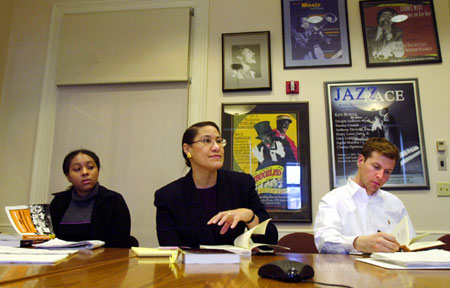Graduate cyber-seminar breaks new ground

In the Locke seminar room in the Barker Center, students in History 2661, “Graduate Readings in 20th Century African American History,” are discussing a biography of W.E.B. Du Bois with their professors, Evelyn Brooks Higginbotham and David Levering Lewis. Lewis brings a unique perspective to the conversation: He’s the book’s Pulitzer Prize-winning author.
It’s the sort of up-close intellectual encounter that draws students to a university like Harvard.
Yet Lewis is not on the Harvard faculty, nor is he in residence as a visiting scholar. Rather, he co-teaches the course remotely, fielding students’ questions and peppering them with his own via videoconferencing.
Each week, Lewis and his three graduate students visit the Barker Center virtually from their home at Rutgers University in New Jersey, appearing in a large video monitor that sits at the edge of the seminar table in Cambridge. A camera atop the monitor beams Higginbotham and her six students to the Rutgers conference room.
The resulting cyber-seminar – the first of its kind in the Faculty of Arts and Sciences (FAS) – has proved that the whole is greater than the sum of its parts.
“It adds a lot more vibrancy to the discussion,” said seminar member Daniel Sussner, a Ph.D. candidate in history at Harvard. “There’s no lull. It’s jumping back and forth as quickly as the electrons off the screen. It’s really a high-energy session, and I really get a lot out of that.”
Indeed, a recent seminar had the students and professors playing a game of intellectual volleyball, tossing theses, questions, and rebuttals from table to monitor, from Cambridge to New Jersey. “How American was Du Bois?” “Had he been used by the Communists?” “What are the perils of oral history?”
Technology meets pedagogy
The idea for cyber-seminar was hatched a year ago, when Higginbotham asked Lewis, then a visiting professor at Harvard, to join her seminar when they discussed his book. Lewis suggested that they try to sustain the effort by technologically linking his class with hers when he returned to Rutgers.
“It was a great idea, because our students get a chance to interact with another group of students, to hear how they think,” said Higginbotham. In addition, she said, “it’s quite a treat to be able to talk to someone about his own book.”
Higginbotham credits several green-lighting efforts along the way: Paul Bergen, senior manager of the FAS Instructional Computing Group, and Robert Doyle, director of instructional media services, assured the two professors their idea could be realized; the History Department gave Higginbotham their support; and the Afro-American Studies department purchased the necessary equipment.
Greg Morrow, assistant manager of multimedia projects in FAS Media and Technology Services, worked with Higginbotham, Lewis, and his technical counterpart at Rutgers to ensure that the two classrooms connected week after week.
Morrow originally employed IP technology, which delivers video and audio the way the Internet delivers e-mail, to link the two classes. It was quickly deemed substandard: When Harvard’s Internet connection was loaded with e-mails or other activity, the video would freeze up or crash.
The class met in a cavernous room in Sever Hall while they awaited the installation of an ISDN line – a telephone line dedicated to transport video and audio – in the Barker Center. Since that line was installed, several weeks into the course, the connection has been seamless.
For their part, Higginbotham and Lewis have collaborated on assignments and negotiated the other school’s spring breaks. While they work in tandem, says Higginbotham, each professor assigns papers and grades separately.
Regular e-mail helps the students maintain cross-campus connections between their weekly seminars, and their familiarity with each other belies the miles of physical distance between them.
Enriching the discussion
Morrow knows of several isolated uses of teleconferencing at Harvard, but Higginbotham’s seminar, with its regular two-way discussion, is unique. He believes that teleconference technology has limited use within FAS; it is more appropriate to graduate-level courses where the perspective of a far-flung specialist would provide a vital viewpoint.
Higginbotham, however, is hooked. Having two professors and two groups of students enriches the learning on both sides of the video monitor, she says. Plus, “David and I don’t always agree, which is really fun for me,” she said.
“For historians, for academics, when you have colleagues in other schools, and they’re people you deeply respect … you often think ‘wouldn’t it be wonderful if there were a way where you could have a class and they could connect?’” she said. “I never thought that was possible until this opportunity arose.”




